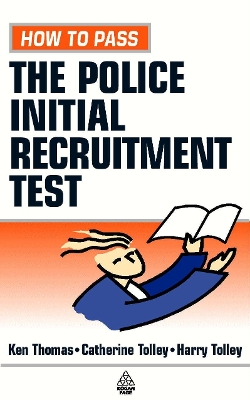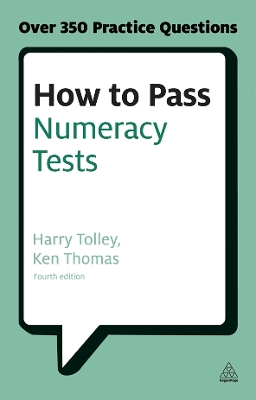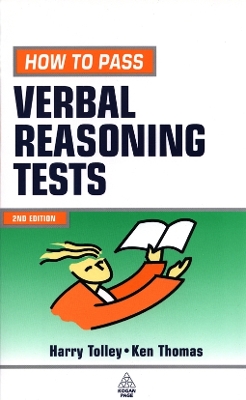Testing
5 total works
How to Pass the Police Initial Recruitment Test
by Harry Tolley, Ken Thomas, and Catherine Tolley
Published 27 February 1997
This text describes the written test that forms part of the selection process for the police forces of England and Wales, also providing ample practice material on verbal usage, checking, number problems, and verbal logical reasoning. It also suggests how to practice observation skills, which are tested on video during selection procedures. The material is based on actual tests prepared for police forces by the authors; similar tests are used by many UK fire services, as well as police services abroad.
Candidates for selection and promotion interviews by large employers will find that numeracy tests are second in use only to verbal reasoning (word-power) tests.
Numeracy tests call for the ability to add, subtract, divide and multiply, usually without the aid of calculators, and to interpret numerical data.
Familiarity with test procedures in advance will increase confidence. This book will help anyone preparing for selection tests containing a numerical element. This new expanded edition offers information, practical advice and many new practice tests (as well as the answers, to allow self-assessment). It deals with the three common types of numeracy test:
number problems
number sequences
data interpretation.
Based on the author's work preparing candidates for the uniformed services and the Civil Service entrance examinations, this book will prove invaluable to all who apply for jobs, promotion or training.
Numeracy tests call for the ability to add, subtract, divide and multiply, usually without the aid of calculators, and to interpret numerical data.
Familiarity with test procedures in advance will increase confidence. This book will help anyone preparing for selection tests containing a numerical element. This new expanded edition offers information, practical advice and many new practice tests (as well as the answers, to allow self-assessment). It deals with the three common types of numeracy test:
number problems
number sequences
data interpretation.
Based on the author's work preparing candidates for the uniformed services and the Civil Service entrance examinations, this book will prove invaluable to all who apply for jobs, promotion or training.
If you are applying for a new job or a promotion it is likely that you will have to face the rigours of an assessment centre. Many organizations, in both the public and private sectors, now use these extended forms of assessment for selection purposes. Many candidates fail to do themselves justice because they are unaware of the different types of assessment tasks they may have to undertake at such a centre. This book provides preparation for extended assessment events and accessible advice on key issues such as: how the assessments are conducted; how you should behave - both in formal and informal situations; how to prepare for the different forms of assessment. Where suitable, the book contains practice material from the various tests involved, such as: group exercises; presentations; psychometric tests; panel interviews; in-tray and role play exercises. With the expert guidance of Harry Tolley and Robert Wood, this book will enable you to prepare fully for the various forms of assessment and maximize your chances of success.
How to Pass the Police Selection System
by Harry Tolley, Billy Hodge, and Catherine Tolley
Published 3 February 2007
Provides detailed guidance on every aspect of the selection process including the required competencies, how to complete the application form, and the tests candidates face at an assessment centre. There are plenty of practice questions and exercises, such as numerical reasoning, verbal logical reasoning, report writing, role play exercises, and advice on the interview itself. Candidates can also find out what to expect from the medical and how to prepare for the physical fitness test.
This book is the most comprehensive guide to the new police recruitment procedures available.
This book is the most comprehensive guide to the new police recruitment procedures available.
Increasing numbers of employers are using verbal reasoning tests, which check understanding and use of written English, as part of their recruitment procedures. Lack of word power can stand in the way of you getting a job, gaining promotion or being offered training.
Candidates who are familiar with testing and have practised answering the type of questions set, within a fixed time limit, stand a much better chance of success.
This new edition will help readers to understand how these tests are set and marked, and gives guidance on preparation for them. It also provides new practice material, with the answers, and information on the following:
Why do employers use such tests?
How are the tests scored?
How can scores be improved?
Based on extensive research carried out by the authors, as part of their work preparing candidates for the uniformed services and the Civil Service entrance examinations, this book will prove invaluable to all job applicants.
Candidates who are familiar with testing and have practised answering the type of questions set, within a fixed time limit, stand a much better chance of success.
This new edition will help readers to understand how these tests are set and marked, and gives guidance on preparation for them. It also provides new practice material, with the answers, and information on the following:
Why do employers use such tests?
How are the tests scored?
How can scores be improved?
Based on extensive research carried out by the authors, as part of their work preparing candidates for the uniformed services and the Civil Service entrance examinations, this book will prove invaluable to all job applicants.



